Are you suffering from an allergy rash caused by a drug, but can’t seem to find relief? Don’t worry – you’re not alone! In this article, we’ll explore strategies for managing drug allergy rash and provide tips on how to get some much-needed relief.
From avoiding certain medications to natural remedies, there are plenty of ways to keep your skin itch-free. Read on for more information and start feeling better today!

Drug allergy can be life-threatening if not treated immediately with an epinephrine injection (EpiPen) or other emergency medications. Keep reading to stay informed and protect yourself from serious risks.
What Should You Do If You Get a Drug Allergy Rash?
- Identify Symptoms Early: Recognize the signs of an allergic reaction, such as hives, itching, and swelling, to seek prompt treatment.
- Immediate Relief Measures: Apply cool compresses, use antihistamines, and avoid scratching to alleviate itching and discomfort.
- Consult Healthcare Providers: Seek medical advice to confirm the allergy and receive appropriate treatment, including alternative medications.
- Prevent Future Reactions: Inform healthcare providers about your allergy to avoid similar antibiotics in the future.
- Monitor for Severe Reactions: Be vigilant for signs of severe reactions, such as difficulty breathing, and seek emergency care if needed.
What is a Drug Allergy Rash?
A drug allergy rash is a skin reaction to a medicine, usually caused by an allergic reaction. Other symptoms include hives, itching, swelling, sometimes pain, and shortness of breath. It can range from mild to life-threatening. Seek emergency medical care if you experience systemic symptoms or if the rash worsens.
What Does a Drug Allergy Rash Look Like?
A drug rash can appear as a variety of skin changes, including bumps, blisters, patches, or peeling skin. The rash can be red, purple, blue, or gray. Below, the three images illustrate different presentations of drug allergy rashes—from raised red patches to widespread irritated areas and small, blister-like bumps.
These examples show some common manifestations; however, it’s important to note that more severe cases may occur and require prompt medical attention.
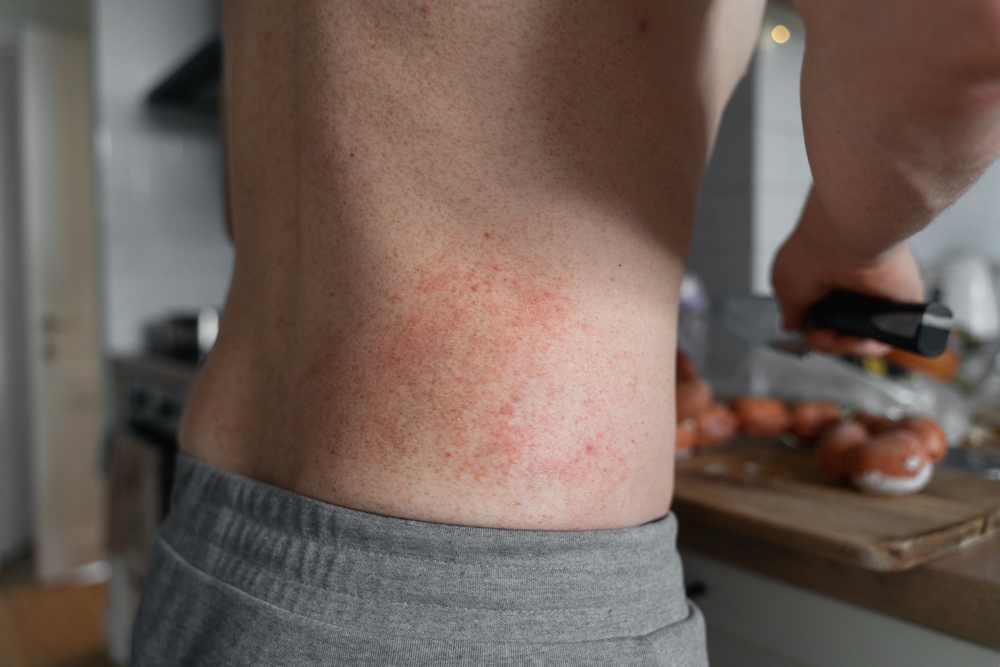
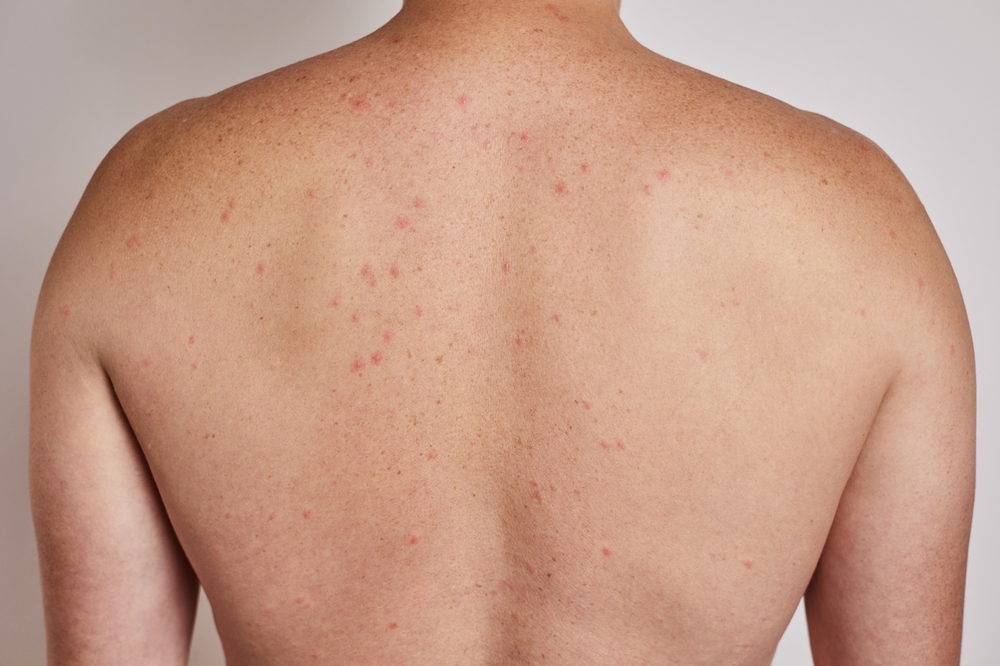
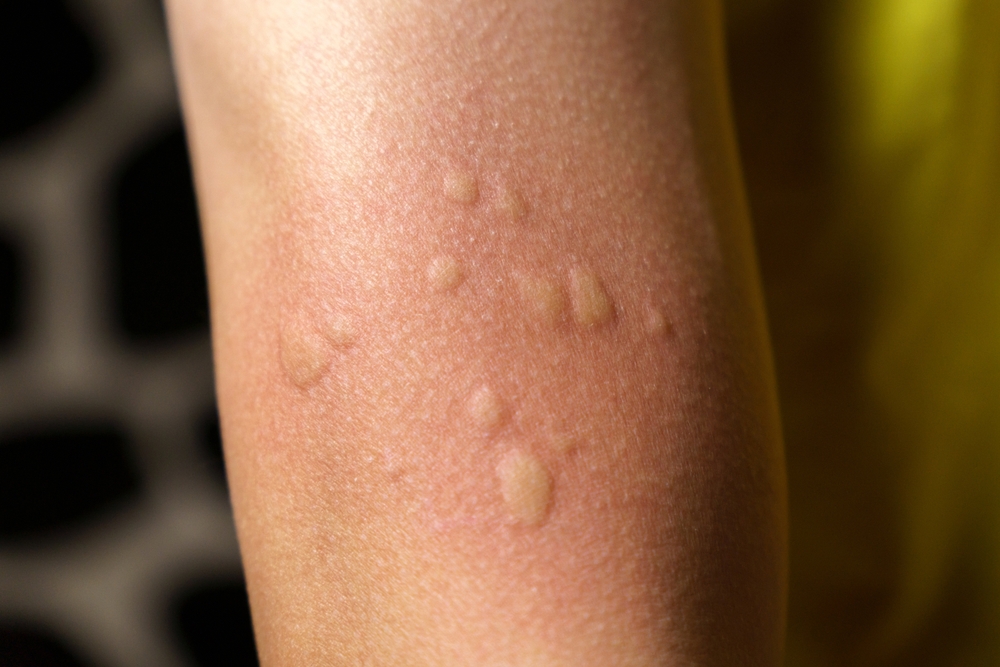
What Are the Common Types of Drug Allergy Rashes?
True allergy
A true allergy occurs when your immune system identifies a drug as a harmful substance and launches an immune response, resulting in an allergic reaction.
Drug hypersensitivity
Drug hypersensitivity is an exaggerated immune response to a medication that may not necessarily involve an allergy. It can cause similar symptoms to a true allergy.
Adverse reactions
Reactions to drugs encompass a broad range of responses to medications, including drug allergy rashes. These can be mild reactions or severe reactions, depending on the individual.
Effects of Drugs on Skin Conditions
Cutaneous Drug Reactions (CDRs) occur when drugs cause changes in skin coloration ranging from yellowish discoloration and purple spots on light skinned people (called purpura) to black patches on dark-skinned individuals (called hyperpigmentation). They may also produce redness, swelling, flaking/scaling, blisters or ulcers on areas exposed directly to sunlight such as face or hands.
If you experience any of these symptoms after taking medication, get emergency medical help right away.
How Are Drug Allergies Diagnosed?
Drug allergies are diagnosed by reviewing your symptoms, medical history, and, if needed, performing allergy tests to confirm the cause.
If you think you’re allergic to a medication, the first step is to talk to your doctor about exactly what happened. Be ready to describe your symptoms in detail—when they started, how long they lasted, and what medications you were taking at the time. Photos of any rashes or swelling can be especially helpful.
Depending on your situation, your doctor may recommend a few different tests. Because symptoms of drug reactions can mimic other conditions, figuring out the exact cause isn’t always easy. That’s why working with experienced allergy specialists is so important.
Consult Penn Medicine Becker ENT & Allergy for expert evaluation and accurate allergy diagnosis.
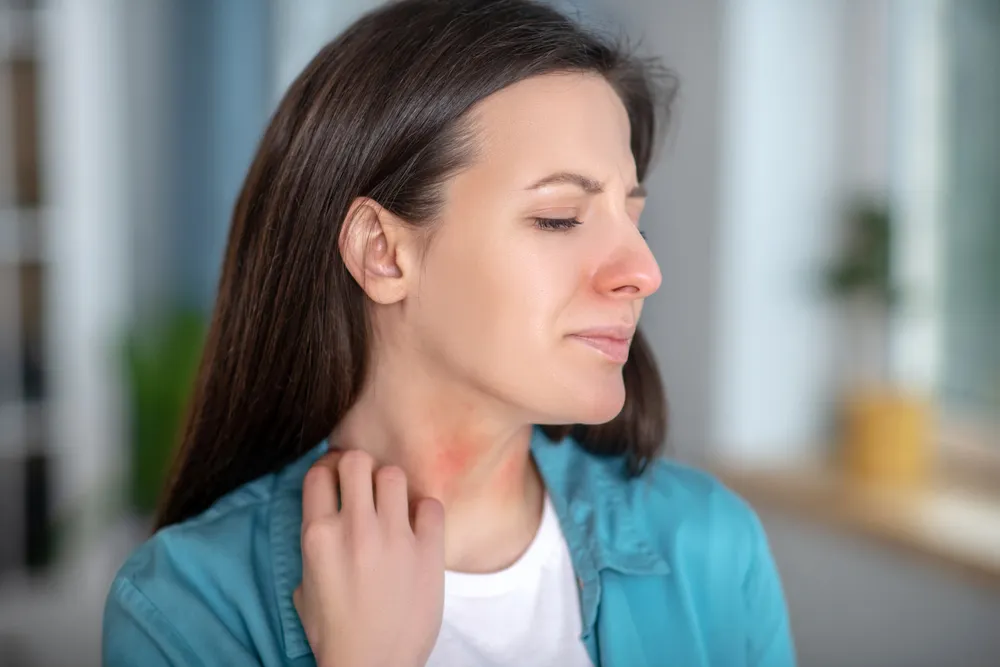
What Tests Can Confirm an Allergic Reaction to a Drug?
Tests can confirm allergies. Skin tests involve adding a small amount of the allergen on the skin to check for swelling or redness. Blood tests check for IgE antibodies. Other tests include patch tests, elimination diets, and oral challenges.
- Skin Tests: Skin tests can help determine if a person has an allergy to certain medication components or other allergens in their environment. During these tests, small amounts of the allergenic substance are applied on areas of exposed skin such as the back or arm. If a reaction occurs within minutes or hours after contact with the substance, it indicates an immediate-type hypersensitivity reaction, indicating an allergy is present.
- Blood Cell Tests: Blood cell tests measure levels of white blood cells (eosinophils) that increase when someone has an allergic reaction, indicating that they have a drug allergy rash or another type of body reaction to a medication.
Secure Your Safe Treatment Experience with Penn Medicine Becker ENT & Allergy
Join our satisfied clients who’ve experienced safe, effective treatments.
What Are the Treatment Options for a Drug Allergy Rash?
You can treat drug allergy rash effectively with medications like antihistamines, topical corticosteroids, and, in some cases, immunomodulators. The first step is to consult your healthcare provider so they can guide you to the best treatment option for your situation.
Effective Medication Options
Using Topical Corticosteroids
8 Ways to Manage a Drug Allergy Rash at Home
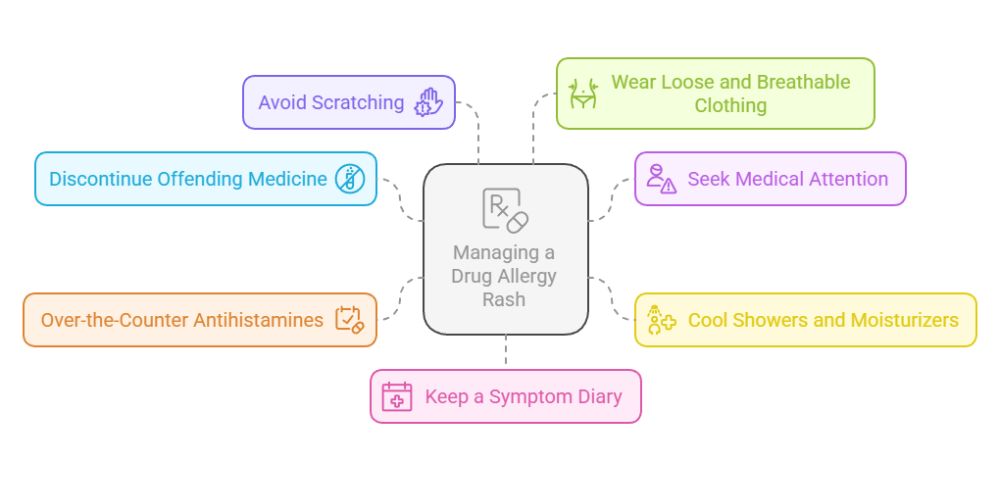
When faced with a drug allergy rash, managing the symptoms and finding relief becomes a top priority. Here are some strategies you can use to ease discomfort and prevent the drug allergy from worsening:
1. Discontinue the Offending Medicine
If you suspect that a particular medication is causing your drug allergy rash, it’s crucial to stop taking it immediately. Discontinuing the offending medicine can help prevent the rash from worsening and give your body a chance to recover.
2. Seek Medical Attention
In cases where the drug allergy rash is severe or accompanied by systemic symptoms, it is essential to seek medical attention promptly. A healthcare provider can assess the severity of the reaction and recommend appropriate drug rash treatment option.
3. Cool Showers and Moisturizers
Cool showers can provide temporary relief from itching and soothe the affected skin. After showering, applying a moisturizer can help keep the skin hydrated and prevent further dryness or irritation.
4. Over-the-Counter Antihistamines
Over-the-counter antihistamines, such as cetirizine or diphenhydramine, can help alleviate itching and reduce the severity of a drug allergy rash. However, it’s important to consult with a healthcare provider or pharmacist before taking any new medication.
5. Avoid Scratching
As tempting as it may be, scratching the affected areas can worsen the rash and lead to skin damage or infection. Use gentle tapping or apply a cold compress instead to relieve itching.
6. Wear Loose and Breathable Clothing
To minimize irritation and discomfort, opt for loose-fitting clothing made from breathable materials such as cotton. This allows better airflow to the skin and reduces friction, promoting faster healing.
7. Keep a Symptom Diary
Keeping a record of your symptoms, including when they occur and what triggers them, can help you identify the specific medication causing the drug allergy rash. This information can be valuable for your healthcare provider in determining the best course of action.
8. Avoid Triggers
Once you have identified the offending medicine, it’s crucial to avoid it in the future. Make sure to inform your healthcare provider and any other medical professionals about your drug allergy to prevent exposure to the triggering drug.
Emergency Symptoms to Watch For
If you experience severe or persistent symptoms from a drug allergy rash, seek immediate medical attention. Critical symptoms include:
- Difficulty Breathing: If you experience wheezing, shortness of breath, or a feeling of tightness in the chest, this could indicate a serious allergic reaction known as anaphylaxis.
- Swelling: Swelling of the face, lips, tongue, or throat requires urgent care as it can obstruct breathing.
- Widespread or Severe Rash: If the rash covers a large area, is painful, blisters, or peels, it may indicate a severe reaction.
- High Fever or Joint Pain: These symptoms can be signs of a more serious condition, such as serum sickness, which requires medical evaluation.
- Persistent Symptoms: If symptoms do not improve with over-the-counter treatments or home remedies, a doctor’s intervention is necessary.

What to Expect During Your Doctor’s Visit
When you visit Penn Medicine Becker ENT & Allergy for a drug allergy rash, you can expect a clear, caring approach to help you feel better fast.
First, your specialist will talk with you about your medical history—like any past reactions and the medications you’re taking now. Then, they’ll take a close look at your rash to see how serious it is. In some cases, they may recommend allergy testing, like a skin or blood test, to find out what’s causing the reaction.
From there, you’ll get a personalized treatment plan. This may include antihistamines to ease itching, corticosteroids to reduce inflammation, or epinephrine for more serious symptoms. If the medication that caused the rash is important, our team will help you find a safer alternative.
If you or a loved one are experiencing symptoms of a drug allergy rash and need professional advice or treatment, don’t hesitate to contact Becker ENT & Allergy. Our team of experienced specialists is here to help you manage your symptoms effectively and ensure your health and safety.

